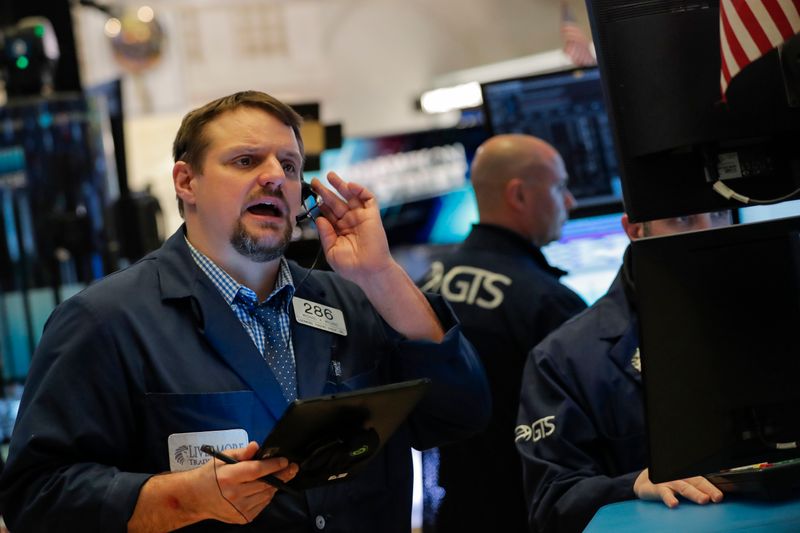This post was originally published on this site
https://i-invdn-com.akamaized.net/trkd-images/LYNXMPEG2H1K2_L.jpg
By Medha Singh
(Reuters) – Wall Street’s main indexes sank again on Wednesday, as growing signs of coronavirus damage to corporate America overshadowed a burst of optimism about sweeping official moves to protect the economy.
Boeing Co (N:) took another big hit, falling 16.1% as the planemaker called for a $60 billion bailout for aerospace manufacturers facing the pain of an extended collapse in global travel.
The S&P 1500 airlines index dropped 13% while hotel operators Hilton Worldwide Holdings (N:), Marriott International Inc (O:) and online agency Expedia (O:) were among the top fallers on the S&P 500 ().
The benchmark slipped 3.82%, inching close to the 7% threshold that triggers another 15-minute halt – a familiar feature of two weeks of huge losses which have shattered Wall Street’s longest ever bull run.
“We’re just in panic mode here,” said Peter Cardillo, chief market economist at Spartan Capital Securities in New York.
“The fear of, maybe, deflation setting in, is probably one of the reasons why the market is acting the way it is.”
Wall Street’s main indexes had bounced on Tuesday from a massive selloff a day earlier, as the Trump administration pressed for a $1 trillion stimulus package and the Federal Reserve relaunched a plan to purchase short-term corporate debt.
However, investors feared that even dramatic stimulus will not be able to avert a deep recession, as the COVID-19 disease continues to spread rapidly across the globe and estimates for the duration of the damage extend out into the summer.
Worries about mass debt defaults or writedowns to come also has U.S. banks under pressure, with the S&P 500 banking subsector down 5.6%.
“If you have lots of companies drawing down their credit facilities to make sure that they can keep their businesses running then it’s a reasonable assumption that banks will have some credit problems down the road,” said Keith Bliss, managing partner at iQ Capital (USA) LLC, in New York.
Apple Inc (O:) dropped 2.9% as analysts anticipated a significant blow to its business from temporary store closures. Even Cheerios maker General Mills Inc (N:), which raised its profit forecast citing consumer bulk-buying, fell 4.3%.
Boeing, just a year ago seen as a perpetual growth stock and a symbol of U.S. tech and industrial power, has now lost more than 60% of its value, while the market overall has fallen by around a third – or around $7 trillion in value.
The collapse into a bear market, among the fastest in history, has spurred some calls for a pause in trading. Treasury Secretary Steven Mnuchin late on Tuesday reiterated the administration will keep markets open, while suggesting trading hours could be shortened at some point.
The idea of shortened hours drew immediate opposition from a number of leading investors and exchange managers, who said it would harm the market’s credibility.
At 10:09 a.m. ET, the Dow Jones Industrial Average () was down 919.45 points, or 4.33%, at 20,317.93, the S&P 500 () was down 96.62 points, or 3.82%, at 2,432.57. The Nasdaq Composite () was down 214.97 points, or 2.93%, at 7,119.81.
Declining issues outnumbered advancers for a 10.65-to-1 ratio on the NYSE and for a 4.70-to-1 ratio on the Nasdaq.
The S&P index recorded four new 52-week highs and 155 new lows, while the Nasdaq recorded six new highs and 421 new lows.

